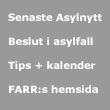ASYLNYTT
Sponsrad av Fridh Advokatbyrå
ARKIV:
EU:s flykting- och gränspolitik
Allmänt om migration, statistik

Asylnytt - Arkiv
Kultur, personer, diverse
Statslösa
Information från myndigheter och organisationer
Pressklipp saknas
- Arkiveringsdatum 220316:
- Stateless people and people at risk of statelessness forcibly displaced from Ukraine
- Arkiveringsdatum 211006:
- UNHCR and Council of Europe urge States to uphold the right to a nationality in Europe
- Arkiveringsdatum 210603:
- Forskaren Barzoo Eliassi: Medborgarskap inte lösningen för statslösa grupper
- Arkiveringsdatum 200624:
- Statelessness Network: "Even before the pandemic, statelessness has been invisible"
Arkiveringsdatum 220316:
European Network on Statelessness 22-03-10:
Stateless people and people at risk of statelessness forcibly displaced from Ukraine
The last census in Ukraine recorded 82,550 stateless people, and UNHCR estimated there to be at least 35,000 stateless and people with 'undetermined nationality' in 2021.
Other sources suggest there could be many thousands more including a significant proportion of the Roma population as well as children born in Crimea, Luhansk and Donetsk since 2014. People fleeing the conflict in Ukraine who are stateless or at risk of statelessness may face significant extra barriers when seeking safety abroad because of their lack of nationality or lack of civil documentation. It is imperative to ensure that they are afforded equal access to protection and that their rights are guaranteed.
In this new briefing, we explain why statelessness is important in the Ukraine refugee response and how frontline responders can identify statelessness as well as avenues for stateless people to access protection, support, and services. The briefing also makes a series of recommendations to the EU, European States, international agencies and NGOs to ensure that routes to protection for stateless people from Ukraine.
We are compiling a list of organisations providing advice to stateless people fleeing Ukraine and we have created a special page on our website which we intend to update with resources as the situation develops. Please share this and get in touch if you would like us to add additional information.
The briefing draws on information from ENS members and partners working on the ground to provide assistance to people fleeing Ukraine in neighbouring countries as well as the Statelessness Index.
Hämta rapporten (Extern länk)
Arkiveringsdatum 211006:
UNHCR 21-09-24:
UNHCR and Council of Europe urge States to uphold the right to a nationality in Europe
Strengthening efforts to end statelessness in Europe and guarantee the provision of fundamental rights to everyone was the key theme of the events organised on 23-24 September in Strasbourg by the Council of Europe's European Committee on Legal Co-operation (CDCJ) and UNHCR, the UN Refugee Agency.
The international conference brought together over 130 senior representatives of Member State governments, national authorities with specific expertise in nationality and statelessness issues, judges, representatives of international and regional organisations, civil society organisations and academics, as well as stateless people.
Statelessness remains a significant issue both globally and in Europe. It is estimated that more than half a million people in Europe are stateless or have undetermined nationality. The right to a nationality is reflected in numerous international treaties, including the Council of Europe's European Convention on Nationality based on the principles of prevention of statelessness and non-discrimination. The right to a nationality constitutes part of a person's social identity and is often a prerequisite to a range of other rights, including access to education, employment, health care, housing and freedom of movement.
The causes of statelessness are multiple, including complexities in nationality laws, State succession, forced displacement, historical and contemporary migration, structural birth registration problems, gaps in nationality and administrative practices. The lack of nationality has a serious impact on the lives of stateless people. The COVID-19 pandemic has further aggravated their already marginalized situation and exacerbated existing inequalities.
(...)
Hela artikeln (Extern länk)
Lynn al Khatib ENS blog 19-09-26: A State of Less (Extern länk)
Arkiveringsdatum 210603:
Linnéuniversitetet 21-06-01:
Medborgarskap inte lösningen för statslösa grupper
Tidigare forskning har visat att medborgarskap till en nationalstat, som Sverige eller Storbritannien, är lösningen för statslösa grupper, till exempel palestinier och kurder. Linnéuniversitetets forskare Barzoo Eliassi visar i sin nya bok Narratives of Statelessness and Political Otherness att det är otillräckligt och inte löser problemet.
Vad innebär det att vara utan en nationalstat? Den frågan har Barzoo Eliassi, docent i socialt arbete, undersökt i den tvärvetenskapliga boken Narratives of Statelessness and Political Otherness. Boken bygger på intervjuer med palestinier och kurder i Sverige och Storbritannien, med fokus på medborgarskap och nationalitet.
- Trots medborgarskap i en nationalstat upplever statslösa grupper att de möts av respektlöshet och ofta saknar en effektiv röst. Verklig jämlikhet uppstår inte förrän nationalstaten avkoloniseras och de-etnifieras, säger han.
Statslöshet är i grund och botten en produkt och ett resultat av exkluderande nationalstater. Barzoo Eliassi menar därför att lösningen inte är att bli medborgare i en nationalstat, utan det är själva nationalstaten som politisk ordning som behöver omformuleras för att inte skapa hierarkier av identiteter inom ramen för staten.
Statslösa exkluderas på den politiska världsarenan
I boken illustrerar han att nationalstater ofta bygger på idéer som främjar nationell likhet, vilket betyder att minoriteter blir föremål för icke-erkännande och assimilation.
- Det är först genom att bli en nation och tillhöra en nationalstat som en grupps politiska existens kan garanteras. På det sättet exkluderas statslösa dessutom på den politiska världsarenan, säger Barzoo Eliassi.
Lösningen, enligt Barzoo Eliassis forskning, är vad han kallar att de-etnifiera och avkolonisera enhetliga nationalstater.
(...)
Hela artikeln (Extern länk)
Läs mer om boken hos förlaget Palgrave Macmillan (Extern länk)
Arkiveringsdatum 210314:
ELENA legal update 21-03-12:
CCPR: The Committee finds violation of stateless child's rights
The Committee on Civil and Political Rights recently published its views in D.Z. v the Netherlands (communication CCPR/C/130/D/2918/2016).
The author, D.Z, was born on 18 February 2010 in the Netherlands and his nationality was indicated as 'unknown' in the municipal records. He complains that leaving him with no avenue to acquire a nationality the Netherlands have violated his rights under article 24 read alone and in conjunction with article 2(2) and (3) CCPR.
D.Z.'s mother was born in China however her birth was not registered on any civil registry. A year later, when her brother was born, her parents abandoned her. In 2004, at the age of 15, she was trafficked to the Netherlands but managed to escape upon her arrival in Amsterdam. She applied for asylum but was rejected. Later when D.Z was born, he was registered as holding "unknown nationality" as his mother had provided no proof of his nationality. D.Z's mother made several attempts to obtain or confirm her Chinese nationality which were ultimately futile. Despite years of efforts, the local municipality rejected D.Z's mother's request to change her son's registered nationality to "stateless" so that he could avail of the international protections afforded to stateless children. A further administrative appeal was also rejected on the ground that there was no proof of D.Z.'s statelessness, such as official documents. D.Z later appealed to the Council of State which also upheld the decision of the municipality but acknowledged that the lack of a status determination procedure meant that individuals entitled to protection, including children were falling through a gap in legislation. The Council of State nevertheless concluded that it was for the legislature to provide a remedy in that regard.
(...)
Läs mer (Extern länk)
Arkiveringsdatum 200624:
European Network on Statelessness May 2020
"Even before the pandemic, statelessness has been invisible"
- Involving stateless people in Europe's COVID-19 response
Nobody understands the impact COVID-19 has on the lives of stateless people better than stateless people themselves. We believe responses to the pandemic must be developed with and informed by communities affected by statelessness. In May 2020, activists and community representatives from across Europe came together with the European Network on Statelessness' support in a series of online meetings to discuss the consequences of COVID-19 and response measures on stateless people in Europe. The group also explored what needs to be done to support and protect stateless people both during and after the pandemic.
The discussions, which took place over four days, have been worked into a position paper, which aims to provide a starting point for the views and experiences of people affected by statelessness to be prioritised and reflected in decision-making during COVID-19 and beyond.
Hämta uttalandet (Extern länk)
Arkiveringsdatum 190826:
UNHCR August 2019:
Gender discrimination and childhood statelessness
Gender discrimination in nationality laws is a root cause of childhood statelessness. Gender-discriminatory policies and practices also contribute to statelessness among children.
Twenty-five countries retain nationality laws that deny women the right to pass their nationality to their children on an equal basis with men. Three countries discriminate against men in terms of their ability to pass their nationality to their children born out of wedlock. These discriminatory laws can render children stateless when they are unable to acquire the nationality of the other parent, which can occur for a variety of reasons.
In some countries, even where women have formal equality before the law with regard to nationality laws, gender-discriminatory policies and practices prevent women from independently accessing birth certificates and identity documentation for their children - documents that are often necessary for children to acquire a nationality.
Children rendered stateless by gender-discriminatory laws and practices are often unable to enjoy a broad range of human rights, including family unity, freedom of movement, and access to education, healthcare, and a range of social services.
Läs mer och hämta rapport (Extern länk)
Källor: Informationen på denna sida är hämtad från följande källor (externa länkar): EU (kommissionen, ministerrådet, parlamentet och domstolen), Europarådet (mr-kommissionären, domstolen, kommittén mot tortyr), FN:s flyktingkommissariat UNHCR, FN:s kommitté mot tortyr m.fl. FN-organ, Sveriges Radio, SvT, andra svenska media via Nyhetsfilter och pressmeddelanden via Newsdesk, utländska media till exempel via Are You Syrious och Rights in Exile, internationella organisationer som Amnesty International, Human Rights Watch, ECRE, Statewatch och Picum, organisationer i Sverige som Rädda Barnen, Asylrättscentrum, Svenska Amnesty, FARR och #vistårinteut samt myndigheter och politiska organ som Migrationsverket, Sveriges domstolar, JO, Justitiedepartementet m.fl. departement och Sveriges Riksdag.
Bevakning: Hjalte Lagercrantz och Sanna Vestin. Sammanställning: Sanna Vestin. Asylnytt är ett ideellt projekt. Sponsring avser prenumerationsavgifter. Tips emottages tacksamt.

 innehåll
innehåll